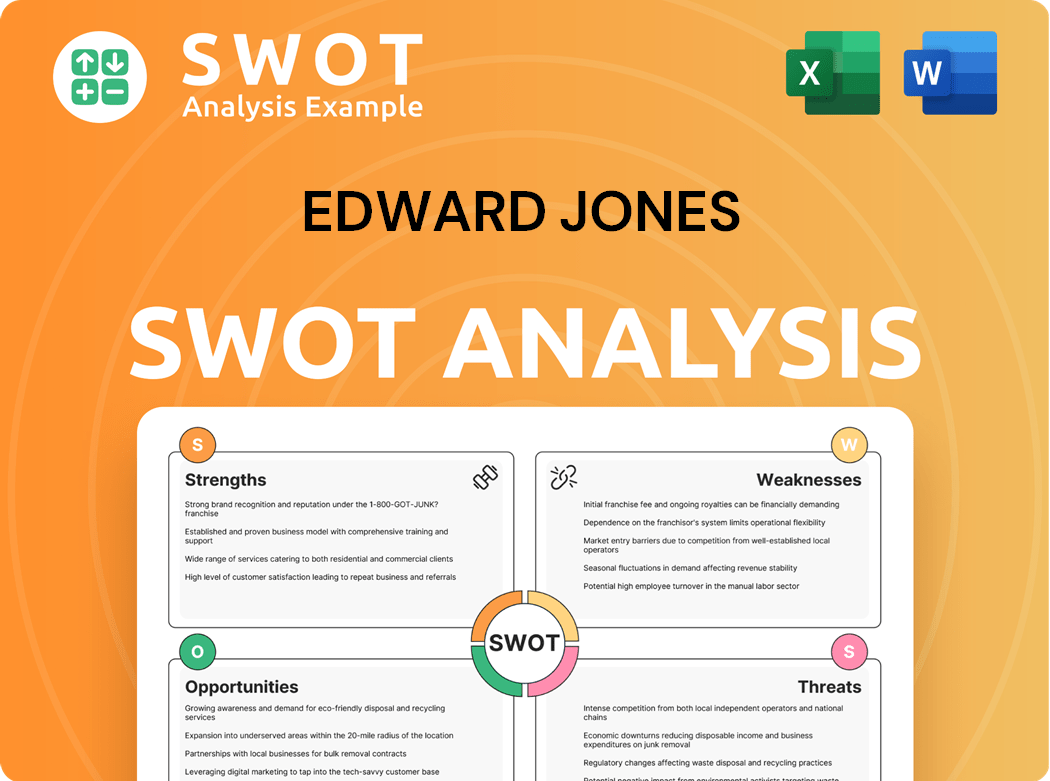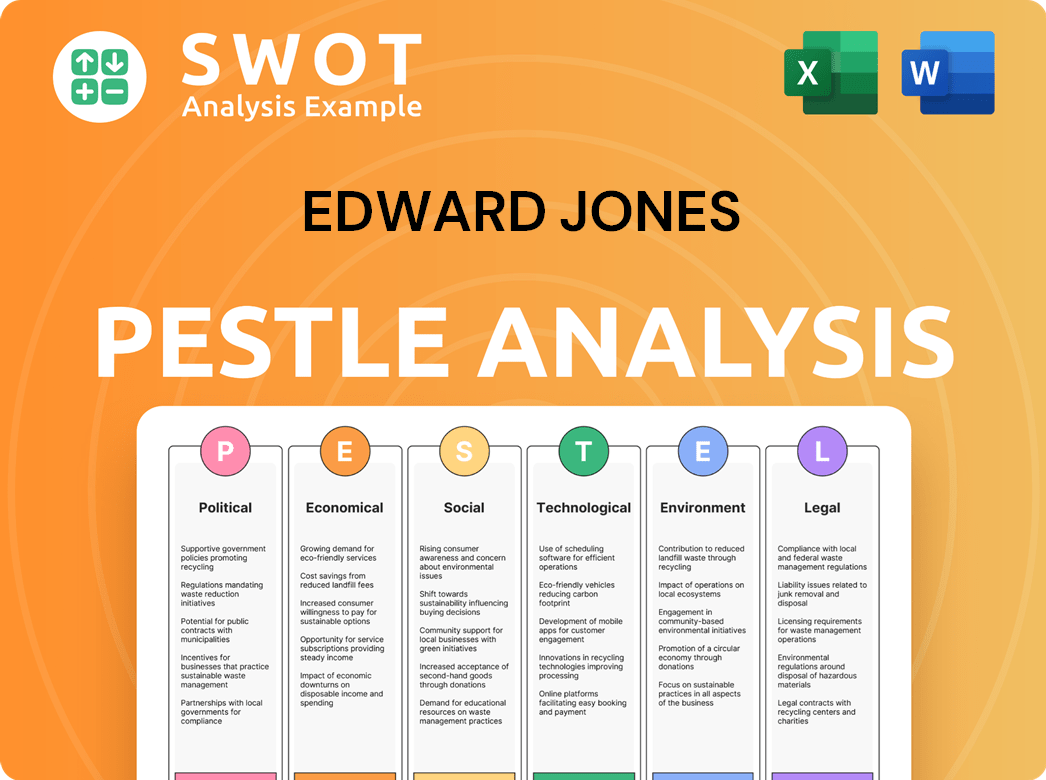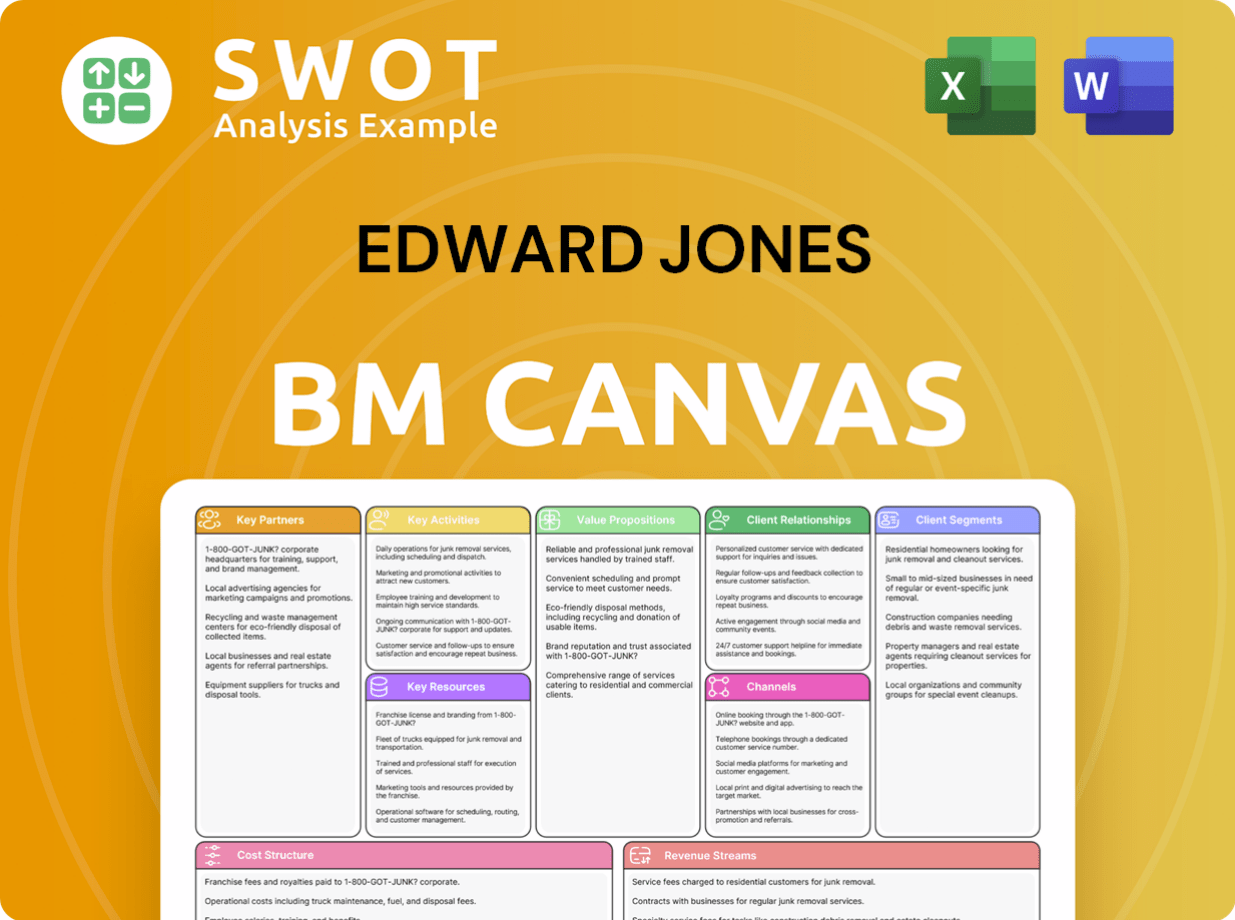Edward Jones Bundle
Can Edward Jones Maintain Its Dominance in a Changing Financial World?
The Edward Jones SWOT Analysis reveals a financial services industry undergoing a seismic shift, forcing established firms to adapt or risk obsolescence. Edward Jones, a giant in wealth management, faces a complex and evolving competitive landscape. This exploration examines the firm's position, its rivals, and the factors shaping its future.

This analysis provides a deep dive into the Edward Jones competitive landscape, offering a comprehensive market analysis of its strengths and weaknesses. We'll dissect Edward Jones competitors, evaluate its industry position, and explore the Edward Jones business model analysis. Understanding these elements is critical for anyone seeking insights into the financial services industry and the strategies of leading investment firms in the wealth management sector.
Where Does Edward Jones’ Stand in the Current Market?
Edward Jones maintains a prominent position within the U.S. financial services industry, focusing on individual investors. Their core offerings include long-term wealth management, retirement planning, and personalized financial advice. This approach has helped Edward Jones secure a strong market presence, consistently ranking among the largest full-service brokerage firms.
As of December 31, 2023, Edward Jones reported client assets under care exceeding $1.9 trillion, showcasing its substantial scale. The firm’s services encompass a wide range of investment vehicles, such as mutual funds, stocks, and annuities. They also provide comprehensive financial planning, insurance products, and retirement solutions to meet the diverse needs of their clients. For a deeper dive into the company's structure, you can explore Owners & Shareholders of Edward Jones.
Edward Jones’s extensive geographic presence, with over 15,000 branch offices across the U.S. and Canada, sets it apart. This widespread network allows the firm to cater to a broad spectrum of clients, from affluent individuals to mass affluent clients. The company's focus on face-to-face interaction, even with the rise of digital platforms, remains a key differentiator.
Edward Jones consistently ranks high in the financial services industry. Although specific market share figures for 2024-2025 are subject to ongoing reporting, the firm's substantial client assets under care, which exceeded $1.9 trillion as of the end of 2023, underscore its market dominance. This financial strength is a key aspect of its competitive advantage.
Edward Jones offers a comprehensive suite of financial services. These include a variety of investment vehicles, financial planning, insurance products, and retirement solutions. The breadth of these offerings allows the firm to serve a diverse clientele with varying financial needs and goals. This variety supports its strong market position.
The firm's extensive branch network is a significant competitive advantage. With over 15,000 offices across the U.S. and Canada, Edward Jones has a strong physical presence. This widespread reach allows the firm to provide personalized service to clients in both urban and rural areas, enhancing its market penetration.
Edward Jones demonstrates robust financial health, which is a key factor in its competitive standing. For instance, its net revenue for 2023 reached $13.6 billion. Its financial stability, often above industry averages for independent broker-dealers, provides a substantial competitive advantage, supporting its long-term growth strategies.
Edward Jones’s market position is built on several key strengths. These include a vast geographic presence, a focus on personalized service, and strong financial performance. The firm's ability to maintain a human-centric approach, even with digital advancements, is a critical differentiator in the wealth management industry.
- Extensive branch network with over 15,000 offices.
- Focus on personalized, face-to-face client interactions.
- Strong financial performance, with net revenue reaching $13.6 billion in 2023.
- Comprehensive service offerings, including investment vehicles and financial planning.
Edward Jones SWOT Analysis
- Complete SWOT Breakdown
- Fully Customizable
- Editable in Excel & Word
- Professional Formatting
- Investor-Ready Format

Who Are the Main Competitors Challenging Edward Jones?
The financial services industry is a dynamic environment, and the competitive landscape for Edward Jones is complex. Edward Jones faces competition from a variety of firms, including large wirehouses, independent broker-dealers, and emerging digital platforms. Understanding these competitors is crucial for analyzing Edward Jones's market position and strategic direction.
The competitive landscape for Edward Jones involves both direct and indirect competitors. Direct competitors offer similar services, while indirect competitors may target different segments or employ different business models. This analysis will explore the key players challenging Edward Jones and how they impact its market share.
Edward Jones operates within a highly competitive financial services landscape, facing challenges from a diverse array of direct and indirect competitors. Its most significant direct competitors include large wirehouse firms, independent broker-dealers, and increasingly, registered investment advisors (RIAs) and digital-first platforms. Major wirehouses such as Merrill Lynch (Bank of America), Morgan Stanley, and UBS Global Wealth Management pose a significant challenge due to their extensive resources, broad product offerings, and established brand recognition. These firms often target high-net-worth individuals and institutional clients, but also compete for the mass affluent segment that Edward Jones serves. For example, Morgan Stanley Wealth Management reported client assets of $6.9 trillion as of Q1 2024, highlighting their substantial scale.
Wirehouses, like Merrill Lynch, Morgan Stanley, and UBS, are major competitors. They have vast resources and target high-net-worth clients.
Independent broker-dealers, such as LPL Financial and Raymond James, offer more flexibility. They attract advisors and clients with a broader range of investment products.
RIAs and digital platforms, like Vanguard and Charles Schwab, are growing competitors. They provide low-cost, technology-driven solutions.
Mergers, such as the acquisition of TD Ameritrade by Charles Schwab, reshape the landscape. These create larger entities with expanded market reach.
RIAs, with their fiduciary standard, present growing competitive pressure. They appeal to clients seeking advice-centric relationships.
Robo-advisors and fintech platforms disrupt the traditional model. They target younger investors with technology-driven solutions.
Independent broker-dealers like LPL Financial and Raymond James also compete directly with Edward Jones, often attracting advisors and clients with more flexible business models or a broader range of investment products. LPL Financial, for instance, supports over 22,000 financial advisors and manages over $1.4 trillion in advisory and brokerage assets as of Q1 2024, showcasing its significant footprint in the independent advisor space. The rise of RIAs, often operating with a fiduciary standard and fee-only models, presents a growing competitive pressure, appealing to clients seeking transparent, advice-centric relationships. Furthermore, new and emerging players, particularly robo-advisors and fintech platforms like Vanguard Personal Advisor Services and Charles Schwab Intelligent Portfolios, are disrupting the traditional competitive landscape by offering low-cost, technology-driven investment solutions, primarily targeting younger investors or those comfortable with less human interaction. Charles Schwab, a diversified financial services firm, reported client assets of $9.1 trillion as of April 30, 2024, underscoring the scale of these integrated competitors. Mergers and alliances, such as the acquisition of TD Ameritrade by Charles Schwab, have further reshaped the competitive dynamics, creating larger, more formidable entities with expanded market reach and technological capabilities. For more insights into the company's history, consider reading a Brief History of Edward Jones.
Edward Jones's competitive landscape is influenced by several factors. These include the size and resources of competitors, the range of services offered, and the business models employed.
- Brand Recognition: Established firms like Merrill Lynch and Morgan Stanley benefit from strong brand recognition.
- Product Offerings: Competitors offer a wide array of investment products and services.
- Business Model: Independent broker-dealers and RIAs offer different fee structures and service models.
- Technology: Fintech platforms and robo-advisors leverage technology to provide low-cost solutions.
- Market Reach: The geographic presence and client base of competitors vary widely.
Edward Jones PESTLE Analysis
- Covers All 6 PESTLE Categories
- No Research Needed – Save Hours of Work
- Built by Experts, Trusted by Consultants
- Instant Download, Ready to Use
- 100% Editable, Fully Customizable

What Gives Edward Jones a Competitive Edge Over Its Rivals?
The competitive landscape for Edward Jones is shaped by its unique approach to financial services. The firm distinguishes itself through a network of financial advisors and a localized branch office model. This strategy emphasizes personal relationships and community presence, setting it apart from larger, more impersonal financial institutions. A key focus is on building trust and providing tailored advice, which caters to clients seeking stability and guidance in their investment strategies.
Edward Jones's competitive edge is rooted in its strong brand reputation and commitment to long-term investing. This focus on client relationships and community engagement has helped the company build a loyal client base. While the rise of digital alternatives poses a challenge, Edward Jones's dedication to its relationship-based model and deep community ties provides sustainable advantages that are difficult for competitors to imitate solely through technology or price. This approach is particularly appealing to clients who value face-to-face interaction and personalized advice.
The firm's business model, as detailed in Revenue Streams & Business Model of Edward Jones, emphasizes a high-touch, personalized approach to financial advice. This strategy has allowed Edward Jones to cultivate strong client loyalty and trust. The company's extensive network of financial advisors, with over 19,000 as of late 2023, operating primarily in one-broker, one-branch offices, is a key differentiator in the financial services industry.
Edward Jones's vast network of over 19,000 financial advisors, primarily operating in individual branch offices, is a significant competitive advantage. This localized presence allows for deep community engagement and personalized client relationships. The firm's focus on face-to-face interactions and tailored advice builds strong client loyalty and trust within local communities.
The firm's reputation for conservative, long-term investing resonates with clients seeking stability and guidance. Edward Jones has built a trusted brand over decades through consistent messaging and a disciplined investment philosophy. This focus on building trust and providing tailored advice has helped the company build a loyal client base.
Edward Jones benefits from economies of scale in technology infrastructure and back-office support, which are centralized to serve its advisor network. This allows for significant investments in training, compliance, and proprietary research. These investments contribute to advisor effectiveness and enhance client service.
A dedicated talent pool, cultivated through rigorous training programs and a strong company culture, is a key differentiator. Edward Jones emphasizes ethics and client service, which contributes to its strong reputation. These advantages have evolved from its founding principles and are leveraged through consistent marketing messages.
Edward Jones's competitive advantages are rooted in its unique business model and client-centric philosophy. These advantages include a vast network of financial advisors, a strong brand reputation, and operational efficiencies. The firm's commitment to personalized advice and community engagement sets it apart.
- Extensive network of over 19,000 financial advisors.
- Strong brand equity and reputation for conservative, long-term investing.
- Economies of scale in technology and back-office support.
- Dedicated talent pool cultivated through rigorous training programs.
Edward Jones Business Model Canvas
- Complete 9-Block Business Model Canvas
- Effortlessly Communicate Your Business Strategy
- Investor-Ready BMC Format
- 100% Editable and Customizable
- Clear and Structured Layout

What Industry Trends Are Reshaping Edward Jones’s Competitive Landscape?
The financial services industry is experiencing significant shifts, creating both hurdles and opportunities for firms like Edward Jones. Key trends include the rapid adoption of digital technologies, evolving client expectations, and a complex regulatory environment. Understanding the Target Market of Edward Jones is crucial in navigating these changes and maintaining a strong competitive position.
Edward Jones's competitive landscape is influenced by these trends, requiring strategic adaptation to remain relevant. The firm must balance its traditional, in-person advisory model with the increasing demand for digital solutions. Simultaneously, it needs to address regulatory changes and heightened competition from both established players and fintech startups. This dynamic environment shapes the future outlook for Edward Jones, impacting its market share and growth strategies.
The financial services industry is seeing an acceleration in digital adoption, with clients expecting online account access, mobile trading, and robo-advisory services. Evolving client demographics, particularly younger generations, favor digital experiences. Regulatory changes, such as those emphasizing client best interests, are increasing compliance demands.
Edward Jones faces challenges from fintech startups offering lower-cost alternatives. A potential decline in demand for in-person advisory services could occur if digital adoption accelerates. Attracting and retaining top financial advisor talent in a competitive market remains a constant challenge. The firm must adapt to maintain its competitive edge.
Edward Jones can leverage technology to enhance its existing relationship model, offering hybrid solutions. Investing in AI-driven analytics can help advisors better understand client needs. There's an opportunity to expand services for affluent individuals and retirees who value human advice. Digital platforms can streamline administrative tasks.
Continued investment in technology is crucial for Edward Jones. Targeted recruitment and training of diverse advisors are essential. Expanding into new service areas, such as specialized wealth planning, could be beneficial. The firm's future competitive position relies on integrating its strengths with advanced digital capabilities.
To thrive in the evolving financial services industry, Edward Jones must focus on several key strategies. These include enhancing digital capabilities, attracting and retaining top talent, and expanding service offerings to meet the changing needs of its client base. Adapting to the changing landscape will be key to long-term success.
- Digital Transformation: Investing in user-friendly digital platforms and tools.
- Talent Acquisition: Recruiting and training a diverse group of financial advisors.
- Service Expansion: Developing specialized wealth planning services.
- Client Engagement: Leveraging AI and data analytics for personalized advice.
Edward Jones Porter's Five Forces Analysis
- Covers All 5 Competitive Forces in Detail
- Structured for Consultants, Students, and Founders
- 100% Editable in Microsoft Word & Excel
- Instant Digital Download – Use Immediately
- Compatible with Mac & PC – Fully Unlocked

Related Blogs
- What are Mission Vision & Core Values of Edward Jones Company?
- What is Growth Strategy and Future Prospects of Edward Jones Company?
- How Does Edward Jones Company Work?
- What is Sales and Marketing Strategy of Edward Jones Company?
- What is Brief History of Edward Jones Company?
- Who Owns Edward Jones Company?
- What is Customer Demographics and Target Market of Edward Jones Company?
Disclaimer
All information, articles, and product details provided on this website are for general informational and educational purposes only. We do not claim any ownership over, nor do we intend to infringe upon, any trademarks, copyrights, logos, brand names, or other intellectual property mentioned or depicted on this site. Such intellectual property remains the property of its respective owners, and any references here are made solely for identification or informational purposes, without implying any affiliation, endorsement, or partnership.
We make no representations or warranties, express or implied, regarding the accuracy, completeness, or suitability of any content or products presented. Nothing on this website should be construed as legal, tax, investment, financial, medical, or other professional advice. In addition, no part of this site—including articles or product references—constitutes a solicitation, recommendation, endorsement, advertisement, or offer to buy or sell any securities, franchises, or other financial instruments, particularly in jurisdictions where such activity would be unlawful.
All content is of a general nature and may not address the specific circumstances of any individual or entity. It is not a substitute for professional advice or services. Any actions you take based on the information provided here are strictly at your own risk. You accept full responsibility for any decisions or outcomes arising from your use of this website and agree to release us from any liability in connection with your use of, or reliance upon, the content or products found herein.